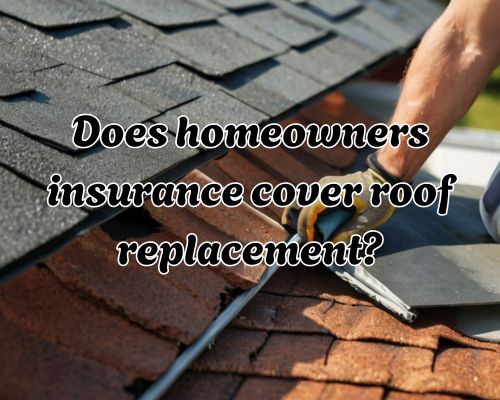
Does Homeowners Insurance Cover Roof Replacement in New Jersey?
When a storm hits, or your roof starts to show signs of wear and tear, one of the first questions you might ask is, “Does homeowners insurance cover roof replacement?” In New Jersey, where unpredictable weather can wreak havoc on properties, understanding your insurance policy’s roof coverage is crucial. With CJ Commercial Roofing NJ, we’ll dive into the specifics of how homeowners insurance works for roof replacements, what’s typically covered, and how New Jersey homeowners can ensure they’re adequately protected.

What Does Homeowners Insurance Typically Cover?
Homeowners insurance is designed to protect your property and belongings from various damages. It typically falls under two main categories: structure coverage and personal property coverage. Roof damage falls under structure coverage, which covers the actual physical parts of your home, including the roof, walls, and foundation.
In general, homeowners insurance will cover roof replacement if the damage is caused by a covered peril (e.g., hail, windstorms, fire, vandalism). However, it’s essential to note that not all damages are included, and coverage often depends on the specifics of your policy.
What Roof Damages Does Homeowners Insurance Cover?
1. Storm Damage (Wind, Hail, and Rain)
New Jersey homeowners are no strangers to severe weather, especially windstorms and hail, which can cause significant damage to a roof. If your roof is damaged due to these weather events, your homeowners insurance policy is likely to cover the repair or replacement costs.
For instance, if high winds from a tropical storm or hurricane tear off shingles, causing leaks and water damage inside your home, your homeowners insurance would typically cover the repairs. Hail damage is also common in New Jersey, and many insurance policies will cover the cost of a roof replacement when hail punctures or cracks shingles.
2. Fire Damage
If your roof is damaged due to a fire (whether it’s caused by a lightning strike or an interior fire), homeowners insurance will typically cover the cost of repairs. Fire damage to the roof can be devastating, and most policies offer comprehensive protection against it.
3. Vandalism or Theft
If a malicious individual damages your roof, such as by ripping off shingles or causing other harm to the structure, your homeowners insurance may cover the damage under the vandalism clause of your policy.
What Roof Damages Are Not Covered by Homeowners Insurance?
While homeowners insurance offers valuable coverage for roof repairs, there are exceptions. It’s important for New Jersey homeowners to understand what isn’t covered by their policy.
1. Wear and Tear or Maintenance Issues
Homeowners insurance will not cover roof replacement if the damage is due to general wear and tear or lack of maintenance. If your roof is simply old and showing signs of deterioration, this isn’t typically covered. In New Jersey, where extreme temperatures can accelerate roof aging, homeowners should be proactive in maintaining their roof.
A roof’s lifespan varies depending on the material. Asphalt shingles last around 20-25 years, while metal roofs can last up to 50 years. If your roof is at or near the end of its lifespan, homeowners insurance likely won’t cover the full cost of replacement.
2. Flood Damage
Flooding is not covered under standard homeowners insurance policies. If your roof is damaged due to a flood, such as from a swollen river or coastal storm surge (common along New Jersey’s coastline), you’ll need separate flood insurance to cover that damage. Standard homeowners insurance does not protect against flood-related damage.
3. Negligence
If your roof becomes damaged due to negligence, such as failing to address a known issue or allowing debris to accumulate, insurance will not cover repairs. New Jersey homeowners should inspect their roofs regularly, especially after storms, to catch issues early.
Roof Replacement vs. Roof Repair: What’s the Difference?
Understanding the difference between roof replacement and roof repair is crucial when dealing with insurance claims. A roof replacement involves completely tearing off the old roof and installing a new one, while roof repair focuses on fixing specific areas of damage.
Insurance companies tend to favor repairs over replacements if the damage can be fixed at a lower cost. However, if the damage is extensive and a repair will not restore the roof’s integrity, your policy may cover the full replacement.
For professional needs, just visit https://cjcommercialroofingnj.com/.
Will Insurance Cover the Full Cost of Roof Replacement?
Homeowners insurance in New Jersey typically pays for repairs or replacements after your deductible is subtracted from the total claim amount. The deductible is the portion of the cost that you’re responsible for paying out-of-pocket before insurance covers the rest.
Additionally, some policies provide coverage on an actual cash value (ACV) basis, while others offer replacement cost value (RCV) coverage.
Actual Cash Value (ACV)
ACV accounts for depreciation. If your roof is 10 years old, the insurer will calculate the depreciated value of the roof based on its age and wear. As a result, you may receive less money than the full replacement cost.
Replacement Cost Value (RCV)
RCV coverage ensures you get the full amount it would cost to replace your roof with materials of similar quality, regardless of depreciation. This policy is more expensive but provides more robust coverage for roof replacements.
How to File a Roof Replacement Claim in New Jersey
Filing a roof replacement claim is a straightforward process, but there are a few things you should keep in mind:
- Document the Damage: Take pictures of your damaged roof and any resulting interior damage. The more evidence you have, the better your chances of getting a full claim payout.
- Contact Your Insurance Company: Reach out to your insurance company to start the claim process. Be prepared to explain the cause of the damage (storm, fire, vandalism, etc.).
- Get an Inspection: Your insurer will likely send an adjuster to inspect the damage. It’s important to have a professional roofer assess the damage as well. You may even want to hire an independent adjuster if you believe the insurer’s assessment is unfair.
- Review the Terms of Your Policy: Before accepting any offer from the insurance company, carefully review the terms of your policy and the offer they’ve made. Ensure that it covers all the repairs you need.
Conclusion: Roof Insurance Coverage in New Jersey
In New Jersey, where extreme weather conditions can strike at any moment, understanding your homeowners insurance coverage is essential. While homeowners insurance typically covers roof replacement caused by covered perils like storms, fire, or vandalism, it won’t cover damages caused by lack of maintenance, wear and tear, or flooding.
New Jersey homeowners should ensure their insurance policy offers the right protection for their roof, and they should be proactive in maintaining their roof to avoid costly out-of-pocket expenses. Be sure to review your insurance policy carefully, and if in doubt, consult with a roofing expert or an insurance professional to ensure you’re fully covered when disaster strikes.





